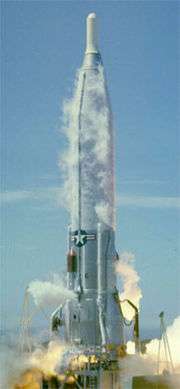Common Core Booster
 The CCB of Atlas V AV-021 is erected at the Vertical Integration Facility of SLC-41 ahead of the launch of the Solar Dynamics Observatory | |
| Manufacturer | Lockheed Martin (1998–2006) United Launch Alliance (2006—) |
|---|---|
| Country of origin | United States |
| Used on | Atlas V (stage 1) Atlas V Heavy (boosters, cancelled) GX (stage 1, cancelled) |
| General characteristics | |
| Height | 32.46 metres (106.5 ft) |
| Diameter | 3.81 metres (12.5 ft) |
| Gross mass | 306,914 kilograms (676,630 lb) |
|
| |
| Engine details | |
| Engines | One RD-180 |
| Thrust | 4,152 kilonewtons (933,000 lbf) |
| Burn time | 253 seconds |
| Fuel | LOX/RP-1 |
The Common Core Booster (CCB) is an American rocket stage, which is used as the first stage of the Atlas V rocket as part of its modular design. It was also intended that two additional CCBs would be used as boosters on the Atlas V Heavy, however this configuration has not been developed. Use of a Common Core Booster as the first stage of the Japanese GX was also planned; however, this programme was cancelled in late 2009.
The Common Core Booster is 32.46 metres (106.5 ft) long, has a diameter of 3.81 metres (12.5 ft) and is powered by a single RD-180 engine burning RP-1 and liquid oxygen.[1]
Testing of the CCB and its RD-180 engines was conducted in the United States at the Marshall Space Flight Center, and in Khimki, Russia. The test programme concluded with the final engine test in December 2001.[2] The first launch of a Common Core Booster was the maiden flight of the Atlas V, which was launched from Space Launch Complex 41 at the Cape Canaveral Air Force Station on 21 August 2002.[3] As of January 2015, the Atlas V has made fifty-two flights, all of which have used a single Common Core Booster.[4]
See also
- Universal Rocket Module, the Russian Angara common core.
- Falcon Heavy, the SpaceX Falcon 9 multi-core variant.
References
- ↑ Wade, Mark. "Atlas CCB". Encyclopedia Astronautica. Retrieved 10 September 2010.
- ↑ "Lockheed Martin's Atlas V RD-180 Engine Successfully Completes Testing Program". SpaceRef. 19 December 2001. Retrieved 10 September 2010.
- ↑ McDowell, Jonathan. "Launch Log". Jonathan's Space Page. Retrieved 10 September 2010.
- ↑ Kyle, Ed. "Atlas 5 Launch Record". Space Launch Report. Retrieved 7 February 2015.
